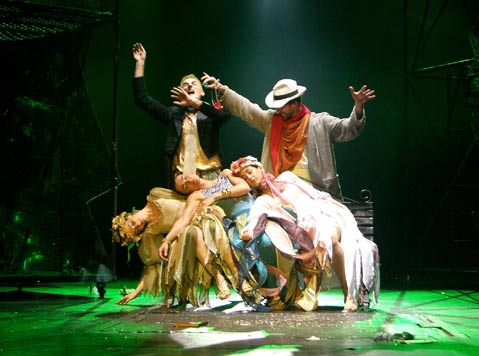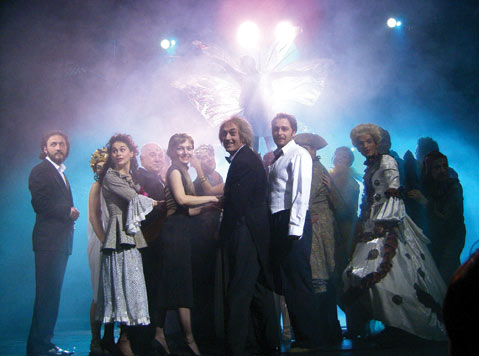The State Theatre of Georgia Visits S.B.
Company to Perform A Midsummer Night's Dream

Shielded for nearly 70 years behind the iron curtain, long overshadowed by its northern neighbor Russia, and now struggling once again for political stability, the Republic of Georgia has been beset with challenges to its independence for all of modern history. Before the events of this past August brought the country of fewer than five million people into the international spotlight, many Americans had never heard of the place. Even now that the South Ossetia War has made world headlines, most of us still know little about Georgia’s culture and its history. But despite its relative obscurity on the world stage, Georgia has a long and rich artistic tradition, especially in the performing arts, and the small country increasingly is eager to share its unique culture with the international community.
Next week, those interested in learning more about Georgia will have an unprecedented opportunity to do so when the Marjanishvili State Theatre performs a distinctly Georgian version of A Midsummer Night’s Dream at the Lobero Theatre. As part of the second biennial Lit Moon World Shakespeare Festival, which runs from October 16-26, 18 Georgians will arrive in Santa Barbara-most of them on their first visit to America-bringing with them a dramatic work that tells us something of their nation’s dreams, its hopes, and its heartaches.
Getting Exposure
The story of how a theater company from Tbilisi, Georgia, made its way to Santa Barbara, California, truly is an international one, and it begins in Scotland, where in the summer of 1994, a young American theater professor was visiting the Edinburgh Festival. That young man was John Blondell, and what he saw that summer changed the course of his life.
Blondell had earned his PhD at UCSB in 1990, and has been teaching modern theater theory and practice at Westmont College ever since. “Of course I had exposure to European theater as well as Anglo-American theater from my professors at UCSB,” he explained recently, “but in Edinburgh, I discovered this rich theatrical tradition from Central and Eastern Europe. I saw productions from the Ukraine, Hungary, Poland, Bulgaria, and Russia. There was incredible theatricality and exuberance to these performances-different kinds of acting techniques and methods that were unusual to somebody who was trained in American theatrical realism and the American musical-comedy tradition. I became fascinated.”
Blondell returned to Santa Barbara and founded the Lit Moon Theatre Company, at first experimenting primarily with nonverbal, physical theater. He began looking for opportunities to travel to Eastern Europe-to date, he has been back at least 10 times-and to seek out collaborations with theater artists from that region. In Prague in 2000, he stumbled across a retrospective of the work of Czech scenographer Milon Kalis and knew he’d found a creative partner. Kalis went on to design three shows for Lit Moon, including a Hamlet in which the set consisted primarily of strips of butcher paper.
It was that Kalis-designed production of Hamlet that Lit Moon took to Poland in 2004 to participate in an international Shakespeare festival. There, Blondell witnessed productions that re-imagined Shakespeare in ways that moved and inspired him, and he came home determined to create a sister festival in Santa Barbara. In 2006, the Lit Moon International Shakespeare Festival was born.

Reaching Out
In its inaugural year, the festival included three productions by Lit Moon and one from UCSB’s Theatre Artists Group, as well as those by visiting companies from Poland, Bulgaria, Prague, and Canada. The centerpiece of the 2006 festival was the Bulgarian National Theatre’s all-male production of Romeo and Juliet, directed by Lilia Abadjieva. Writing later about the production, Blondell expressed his admiration for “her idiosyncratic, highly identifiable directorial style-a compelling, kinetically charged kind of physical theater that is filled with popular culture allusions, appealing eroticism, and wild comedy.” Abadjieva’s two sold-out shows at the Lobero ended with a 20-minute torrential downpour in which the star-crossed lovers slipped and fell, clinging to one another for support only to slide again and again into a growing pool of water. This was no starchy, anachronistic rehashing of the most famous love story of all time, but a fresh, new interpretation of those old, familiar struggles. Blondell had introduced to Santa Barbara a brave new world for Shakespeare’s plays: one in which naturalism was often rejected in favor of metaphor, and even the text could be adapted in pursuit of the emotional truths that lay beneath it.
Back in Poland in 2006, Blondell met Ekaterina Mazmishvili, the general manager of Georgia’s Marjanishvili State Theatre, and its artistic director Levan Tsuladze, who handed him a videotape of a Marjanishvili production of A Midsummer Night’s Dream. A year later, Blondell saw the production live, and knew immediately he wanted it for his Santa Barbara festival. Little did Blondell imagine at the time what a challenge it would be to fly 18 of the company’s artists and technicians out of a war-torn nation and to secure work visas and legal documentation for them-all while rehearsing his own company’s productions, teaching classes, and coordinating the rest of the 2008 festival. That he has succeeded in doing so, with the help of UCSB Arts & Lectures, is a triumph both for the festival and for the greater community. Santa Barbara has never seen a Georgian theater production of any kind, and this trip marks the 80-year-old company’s first visit to the United States.
Staying Engaged
Georgia’s Marjanishvili State Theatre, founded in 1928, is considered one of Eastern Europe’s most significant theaters, and one of Georgia’s most important cultural monuments. Under the artistic direction of Tsuladze, the company performs regularly at major festivals across Europe, but also attracts a dedicated audience at home, nearly half of whom are younger than 35-a phenomenon that’s virtually unknown in the major theaters of the United States today. Tsuladze’s productions are dynamic and experimental, but they’re also highly professional, and for Blondell, bringing A Midsummer Night’s Dream to Santa Barbara is an artistic coup.
As far as the Georgians are concerned, the spirit of revolution attending this festival isn’t limited to the stage. “Nobody expected war,” Mazmishvili told me on the phone from Tbilisi last week. “War changed everything in just one day, but of course we continue to work. We are not soldiers or politicians; we are theater people.” As she sees it, theater has a central role to play in defining and strengthening culture, and it is exactly Georgia’s culture that is at stake. “In August, everything stopped,” she said. “Our thinking was: First, will I stay alive or not, and second, will my country survive? And then, when the worst was past, we thought about the theater. If we think this country must be stronger than it was, we have to do our work better.”
Santa Barbara is a world away from Tbilisi, but, like Blondell, Mazmishvili sees the company’s visit to America as a vital part of an international conversation. For Georgia in particular, it’s the perfect time to be strengthening its connections. “We don’t have much international context because of our past-the communist period, our financial and social problems-so we are only now re-linking to the world,” Mazmishvili said. “This is what makes us stronger. We also bring something new to the world. People assume Georgian culture is Russian culture, but it is very different. For many people in Santa Barbara, this will be the first thing they have ever seen from Georgia. They will see a performance that’s full of miracles, that’s full of hope, and that’s also very professional. I think they will love this culture, and we’ll get more friends, more links to the world.”
Daring to Dream
Why, when a meaningful cultural exchange is crucial and Georgia’s very survival seems to hang in the balance, would the state theater bring to America a play written in 16th-century England-and perform it in Georgian? According to Mazmishvili and Tsuladze, there’s something about Shakespeare, and about this comedy in particular, that serves as the perfect vehicle to transmit something of the Georgian spirit, language aside. In fact, Tsuladze freely admits to dealing loosely with the text, even allowing some of the spontaneous phrases that come out in improvisation to make their way into the final production. Yet, he says, he’s careful to retain the play’s truths. Mazmishvili explains, “When Levan works with actors, they don’t read texts very much; they go to the stage very quickly. Also, he uses music very early on. His rehearsals are very interesting. Ideas are born there, and in order to bring to public what he wants to say with this performance, sometimes something new is born.” In this way, Mazmishvili suggests, Georgian theater is able to tease something new out of the play-something that was always there but that had remained hidden. What makes such a trick possible, it seems, is a deep belief in the dream world of Shakespeare’s plays-a dream world that perhaps the American dramatic tradition has never known quite what to do with.
“Georgians love Shakespeare very much,” Mazmishvili said. “It’s good for the Georgian character and mentality because it’s very theatrical, and full of dreams. Georgians are that kind of people: they are very full of dreams, they believe in dreams. They believe that other world that Shakespeare talks about really exists. Especially in the hardest times, you always remember your dreams very well. You forget these dreams, but they still exist, and when you have a hard time you remember them, and think about them even more than about reality.”
If Georgian theater has an almost magical capacity to bring forth what was hidden and give physical expression to fantasies, perhaps it’s a dramatic expression of a nation’s dream of freedom. With Russian tanks still lining Tbilisi’s main streets, it may remain a dream deferred. But on the stage, as Puck’s final soliloquy in A Midsummer Night’s Dream reminds us, there is ultimate creative freedom. If theater should cause offense, he suggests, one can simply dismiss it as “a weak and idle theme/No more yielding but a dream.” The rub, of course, is that the theater is only a testing ground for society, and that it’s onstage where a new reality can-indeed, must-be created.
“I think the theater has no borders,” Mazmishvili said. “We have to use everything in order to make theater very good. Levan always says that art and theater exist for people to be better. This is the main goal of everything we create.” Tsuladze himself expresses it this way: “In A Midsummer Night’s Dream, dreams and reality cross over. The modern world is getting less and less romantic; we forget our dreams, slowly. We must believe in marvels again, as we believed and trusted in dreams and miracles in our childhood.”
4•1•1
The Marjanishvili State Theatre of Georgia will perform A Midsummer Night’s Dream at the Lobero Theatre on Tuesday, October 21, and Wednesday, October 22, at 7 p.m. For tickets, call 893-3535 or visit www.artsandlectures.ucsb.edu. For a full schedule of the Lit Moon World Shakespeare Festival or to learn more, visit litmoon.com.



